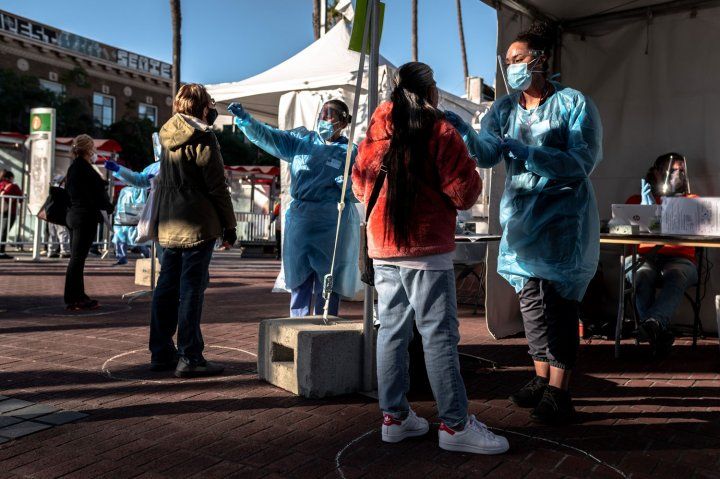COVID-19 Study Finds Increase of Coronavirus Variants in San Francisco’s Mission District

Mission District residents are swabbed for COVID-19 at a pop up test site in front of 24th Mission Bart Station in early December. Continued testing in the area show that a new variant has become much more widespread. Photo by Mike Kai Chen
New results from an ongoing collaborative effort to slow the spread of COVID-19 in San Francisco’s Mission District, a predominantly Latinx community, shows that the prevalence of a coronavirus lineage, characterized by the L452R substitution and two other mutations in the virus’s spike protein, has significantly increased in recent months. This lineage has previously been detected in other U.S. locations, including California, and is now increasingly being found in multiple counties throughout California.
Unidos en Salud, a volunteer-led collaboration between UC San Francisco, the nonprofit Chan Zuckerberg Biohub (CZ Biohub), the Chan Zuckerberg Initiative, the Latino Task Force for COVID-19, and the San Francisco Department of Public Health, provides rapid, low-barrier, walk-up COVID-19 testing and response services to San Francisco’s Mission District community.
In January, Unidos en Salud conducted a COVID-19 study using the BinaxNOW rapid antigen test to collect and analyze positive results. A total of 8,846 people were tested as part of the month-long study. Genomic sequencing of the virus from over 630 positive samples was used to monitor for the emergence of new variants or introduction of new viral strains, providing an accurate view of which viruses are circulating in this community.
“The research findings indicate that the L452R variant represents 53 percent of the positive test samples collected between January 10th and the 27th. That is a significant increase from November when our sequencing indicated that this variant comprised only 16 percent of the positive tests,” said UCSF infectious disease expert Diane Havlir, MD, co-founder of the Unidos en Salud initiative and professor of medicine at UCSF.
With the assistance of the Mission District community, the collaborators were also able to investigate key questions about household transmission, symptoms, and infections in children. According to the research findings, the L452R variant has an elevated household secondary attack rate (the apparent transmission within a household), suggesting that it is more transmissible than other strains.
“The research indicates that the household secondary attack rate of the L452R variant identified in the Mission District appears to be higher than other rates that have been measured within the United States and globally, but more work needs to be done to confirm these findings. There is an urgent need for research to better understand the implications for transmissibility, and for continued genomic sequencing and surveillance to understand the variants’ prevalence, reach, and spread,” said CZ Biohub co-president Joe DeRisi, PhD.
The study also identified one case of P.2 – a variant lineage containing the spike E484K mutation, first identified in Brazil in an individual who was reinfected with the virus – though contact tracing suggests there was no forward transmission of this variant. Other variants associated with the spike protein were also identified through the study, confirming the need for ongoing surveillance to understand and track their spread, as well as laboratory experiments to understand their significance.
“The Latinx community continues to be disproportionately impacted by COVID-19 and the uptick of the L452R variant among our community is concerning,” said Jon Jacobo, health committee chair with the Latino Task Force. “Unidos en Salud is an important partnership to help track and contain the virus. It’s a model that I believe should be adapted in communities across the country.”
Outside of the Mission District collaboration, efforts are underway to track variants of the virus statewide in California. The California COVID Tracker, a joint effort between Chan Zuckerberg Initiative, CZ Biohub, and the State of California has provided free whole-genome sequencing and analysis of the SARS-CoV-2 virus to all California Departments of Public Health and local health jurisdictions since July 2020, enabling officials to better map the virus. To date this partnership has done roughly 45 percent of all sequencing in California and 5 percent of the nation’s sequencing efforts.
Unidos en Salud recently announced a partnership with the San Francisco Department of Public Health to bring vaccines to the people of the Mission District. The Latino Task Force efforts in the Mission District are supported by the Chan Zuckerberg Initiative and aim to bolster resources in a community that has been deeply affected by the spread of COVID-19.
About UCSF: The University of California, San Francisco (UCSF) is exclusively focused on the health sciences and is dedicated to promoting health worldwide through advanced biomedical research, graduate-level education in the life sciences and health professions, and excellence in patient care. UCSF Health, which serves as UCSF’s primary academic medical center, includes top-ranked specialty hospitals and other clinical programs, and has affiliations throughout the Bay Area. Learn more at ucsf.edu, or see our Fact Sheet.
About CZ Biohub: The Chan Zuckerberg Biohub is a nonprofit research center that brings together physicians, scientists, and engineers from Stanford University, UC San Francisco, and UC Berkeley. CZ Biohub seeks to understand the fundamental mechanisms underlying disease and develop new technologies that will lead to actionable diagnostics and effective therapies. Its ultimate vision is to cure, prevent, or manage all disease by the end of the century. To learn more, visit CZBiohub.org.